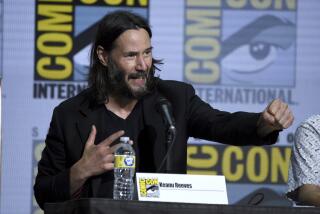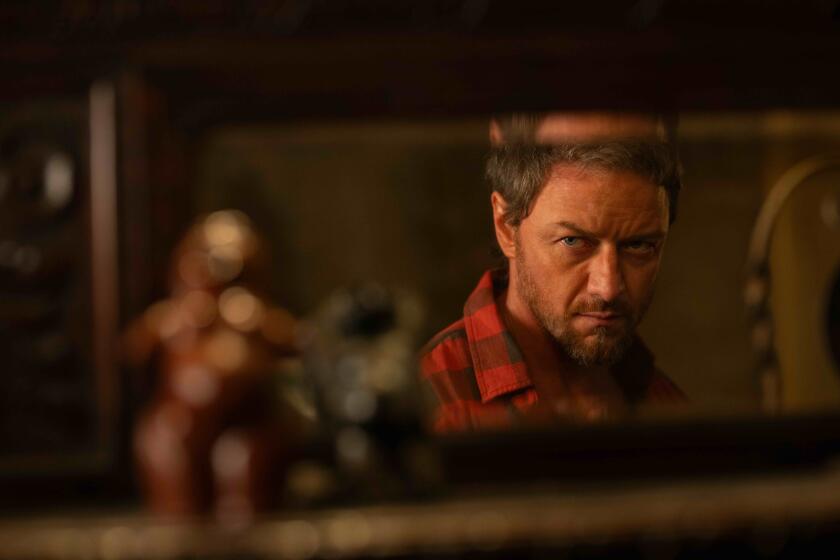Indie Focus: Bold new worlds in ‘Annihilation,’ ‘Mute’ and ‘The Young Karl Marx’
Hello! I’m Mark Olsen. Welcome to another edition of your regular field guide to a world of Only Good Movies.
For The Envelope, Glenn Whipp spent some time in Encino with filmmaker Paul Thomas Anderson, who was in a playful and chatty mood. Anderson’s “Phantom Thread” could be seen as an variation on the battle of the sexes, as a rigidly controlling fashion designer meets his match in a free-spirited, headstrong woman.
Anderson said he has enjoyed hearing from couples about how they see themselves in the film and who plays which role.
“You’d be surprised,” Anderson said. “It’s a 50-50 split, people coming up to me and saying that the woman is filling the Reynolds Woodcock role. Usually, they’re relating it to breakfast scenarios where someone’s too noisy.”
And I wrote something this week about how the success of “Black Panther,” coming on the heels of “Star Wars: The Last Jedi,” “Thor: Ragnarok,” “Wonder Woman,” “Logan” and other titles, seems to be heralding a new moment for filmmaker-driven franchise filmmaking, the era of the artisanal blockbuster.
We have a screening event and Q&A coming up this week for the film “Thoroughbreds” starring Anya Taylor-Joy and Olivia Cooke that will be announced soon. For info and updates on future events, go to events.latimes.com.
‘Annihilation’
The new movie from “Ex Machina” filmmaker Alex Garland is an adaptation of the novel “Annihilation” about a group of women attempting to discover the cause of unexplained phenomena. The film is by turns icily cerebral and viscerally terrifying, a sci-fi horror mutation with an incredible ensemble including Natalie Portman, Tessa Thompson, Jennifer Jason Leigh, Gina Rodriguez and Oscar Isaac.
In his review for The Times, Justin Chang wrote of the film, “Its most impressive achievement may be how easily it welds the mechanics of genre and the cinema of ideas. Garland’s movie has its grisly flourishes, but unlike so many thrillers that preoccupy themselves with spectacles of death, it’s more interested in pondering the strange, inextricable link between creation and destruction.”
Jen Yamato spoke to Portman, Rodriguez and Thompson about the movie, their friendship and the current spirit of purpose and activism among women in Hollywood.
Thompson said “Annihilation” is “the kind of movie where if you’ve seen it only once you haven’t seen it. One of Alex’s references for this film was [Andrei Tarkovsky’s] ‘Stalker,’ which I watched a couple times in anticipation of making this movie, trying to figure out what that film is, and means. It felt like being inside of a meditation.”
Akiva Gottlieb spoke to Jeff VanderMeer, author of the novel. Of Garland’s adaptation of his book, VanderMeer said, “I wasn’t really that concerned about it being faithful. I was interested in it being a useful and unique interpretation .… The way he was talking about the book, I knew that the things he was changing were in reaction to the book. I knew that the book was still there.”
At the New York Times, Manohla Dargis pegged Garland as “a genre guy, and while he enjoys unleashing blunt horror-film scares, he’s especially good at creating a sense of intimate menace, the kind that can brusquely change vibes and temperatures, and just as quickly turn characters into antagonists.”
Emily Yoshida reviewed the film for Vulture. But she also wrote a separate, fascinatingly detailed exploration of the film’s finale. It’s filled with spoilers, but will be a vital reference for anyone who leaves the film spilling with a desire to talk about it and to know more, a need to answer the question “What was that?”
‘Mute’
The latest film from writer-director Duncan Jones is “Mute,” an ambitious science-fiction detective story set in near-future Berlin. A mute Amish bartender (Alexander Skarsgård) goes looking for his missing girlfriend (Seyneb Saleh), which puts him on course to cross paths with two shady former military surgeons (Paul Rudd, Justin Theroux) who have become underworld fixtures.
Reviewing the film for The Times, Kevin Crust noted that with all the references to films such as “Blade Runner” and even Jones’ own earlier “Moon,” the film “takes homage to an extreme and that’s not necessarily a good thing .… The references, conscious and not, serve as constant reminders to the audience of other, better, movies, rendering ‘Mute’ more atonal hodgepodge than carefully orchestrated pastiche.”
Reviewing the film for Uproxx, Amy Nicholson said, “‘Mute’ is more interesting as a bullet-point list of absurdities than as a two-hour film. Yet, Jones continues to have my attention. He’s one of the only directors making choices that haven’t focus-tested the fantasy out of genre filmmaking .… And he makes mistakes — big, jaw-dropping blunders that provide dangerous thrills that safer, better films don’t. Mistakes don’t give a movie soul. But you can feel human fingerprints on his films.”
‘The Young Karl Marx’
Following up his Oscar-nominated documentary “I Am Not Your Negro” with a fiction feature, Raoul Peck has directed and co-written “The Young Karl Marx.” The film surveys just that, the formative years of the author and how he would come to collaborate with Friedrich Engels on their works that would change the course of history. August Diehl plays Marx, while Stefan Konarske plays Engels and “Phantom Thread” star Vicky Krieps brings her unpredictable energy to the role of Marx’s wife Jenny.
In his review of the film for The Times, Kenneth Turan paid particular attention to the title, asking, “what’s with the ‘young’ part, which brings to mind turbulent emotional dramas rather than trenchant economic theory? Whatever else you think about Marx and his ideas, it’s hard to imagine him as hot-blooded and young .… [Peck] as it turns out, not only understands those contradictions, he is committed to embracing them, which is what makes ‘The Young Karl Marx’ the audacious, engrossing film it is.”
Reviewing the film for the New York Times, A.O. Scott added, “the way his film deals with family matters and gender relations is an aspect of its precision and a measure of its insight. The great virtue of ‘The Young Karl Marx’ is its clarity, its ability to perceive the way the eddies of personal experience flow within the wider stream of history.”
At rogerebert.com, Glenn Kenny called the film “a bold, some might say dialectical exercise. That is, an account of the title character’s life and thought in the packaging of a conventional and possibly sentimental biopic.”
Peck himself wrote about the film for Talkhouse, where he noted, “Our screenplay is based primarily and almost exclusively on the correspondence between Karl, his wife Jenny and Friedrich Engels. The real human beings behind the myth in their own words, wit, liveliness, humor, humanity and revolt .… The ‘Young Karl Marx,’ like most of my films, is about recapturing a more solid narrative. A progressive one, if possible. It’s not about fiction. It is about reality. And as such, its intent is to impact the present reality (and possibly society as a whole).”
Email me if you have questions, comments or suggestions, and follow me on Twitter @IndieFocus
More to Read
Only good movies
Get the Indie Focus newsletter, Mark Olsen's weekly guide to the world of cinema.
You may occasionally receive promotional content from the Los Angeles Times.











